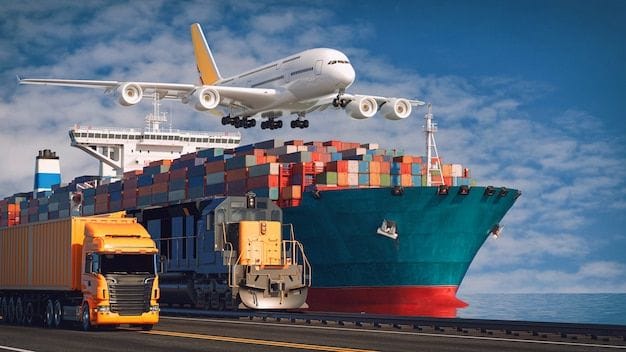
Le transport de fret est un pilier essentiel du commerce mondial, permettant aux entreprises de déplacer leurs marchandises efficacement d’un point à un autre. Que ce soit par voie terrestre, maritime ou aérienne, ce processus joue un rôle clé dans la chaîne logistique en assurant la livraison des produits aux clients finaux ou aux partenaires commerciaux. Dans cet article, nous répondons à quelques questions fréquentes pour mieux comprendre les enjeux et les solutions liés au transport de fret.
Qu’est-ce que le transport de fret ?
Businesses need vehicles to move their goods. But what if you don’t have a vehicle big enough to accommodate all your products? Or a means of transportation that can deliver your goods to a remote destination? That’s where a transportation service comes in, at the heart of freight transportation.
Le transport de fret est le processus consistant à acheminer des cargaisons, des marchandises ou d’autres produits d’un endroit à un autre. Tous les systèmes de chaîne d’approvisionnement et de logistique s’articulent autour du transport de fret, également appelé expédition de fret. Ce processus permet à ces systèmes de transférer aisément des marchandises vers d’autres lieux ou entrepôts, de les livrer aux clients finaux ou de les distribuer à d’autres entreprises.
The different types of freight transport
Freight transport can be carried out by different means: by air, sea or landChoosing the right mode of transportation for your business is essential to ensure convenient, fast and accurate delivery of your products.
- Land or road transport : ideal for short distances or local deliveries. Trucks and trains are generally used.
- Maritime transport : an economical solution for bulky or international cargo, although a little slower.
- Air transport : the fastest method of shipping goods, especially useful for perishable or urgent products.
The challenges of freight transport
Working with freight forwarding companies can sometimes be a challenge. Managing deadlines, customs regulations, and logistics costs can be complex and time-consuming. Whether you’re new to freight logistics or looking for ways to optimize your shipping management, it’s important to have a clear strategy.
How to simplify freight transport management?
To make freight management smoother, here are some tips:
- Automation : Investing in digital solutions for real-time tracking and route management can significantly reduce delays and errors.
- Strategic partnerships : Choosing a reliable logistics partner with experience in your industry can save you a lot of hassle.
- Proactive planning : Anticipating peaks in activity or periods of congestion can ensure better logistical efficiency.
Conclusion
In conclusion, freight transport plays a central role in modern supply chains. A wise choice of transport mode, combined with intelligent logistics management, ensures not only customer satisfaction but also the competitiveness of your company.
FAQs about freight forwarders in Morocco
1. What are the main modes of freight transport?
Freight can be transported by land (trucks, trains), sea (ships) or air (planes), depending on the needs in terms of cost, speed and volume.How do I choose the right mode of transport for my goods?
The choice depends on the nature of your products, the distance, the required time and your budget. For example, sea transport is ideal for bulky cargo, while air transport is suitable for urgent deliveries.Quels sont les documents nécessaires pour expédier du fret à l’international ?
Les documents clés incluent la facture commerciale, le connaissement (Bill of Lading), la liste de colisage, et selon les cas, des certificats d’origine ou des déclarations douanières.





1 Comment
EL Rhabali January 23, 2025
it’s Really interesting !